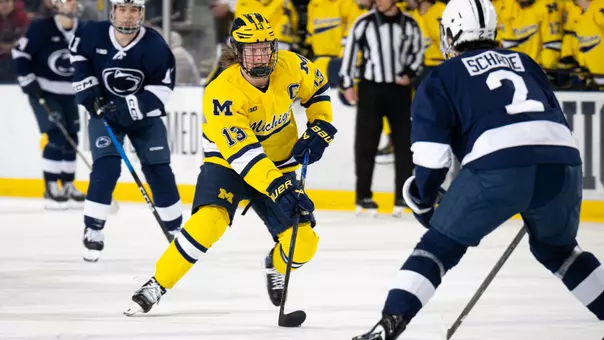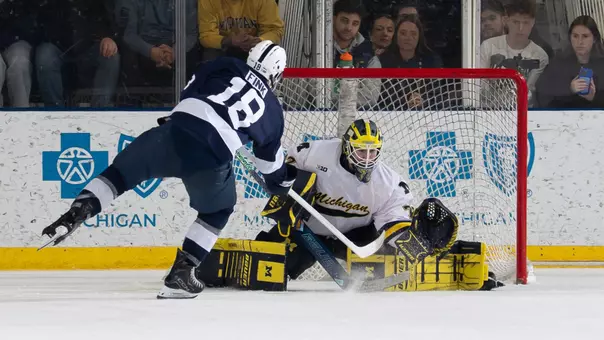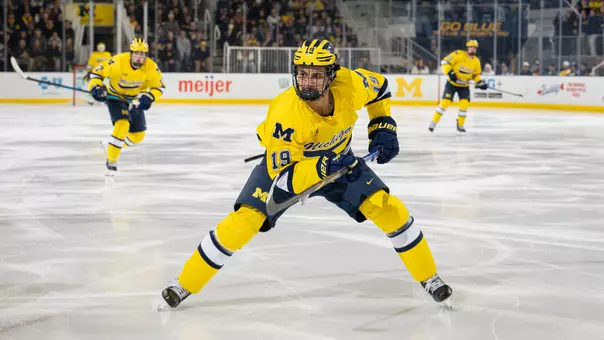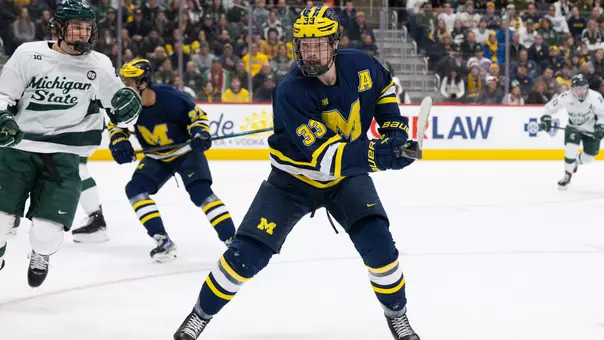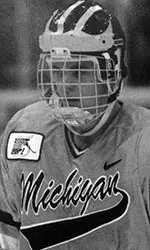
Future Friday: Q&A with Sean Ritchlin
9/18/2015 12:00:00 AM | Ice Hockey
Sept. 18, 2015

Sean Ritchlin (right) with ESPN's John Buccigross (left) and former teammate Marty Turco.
As a member of one of the most decorated classes in Michigan ice hockey history, Sean Ritchlin (1996-99) looks back on his four years at Michigan with a lot of pride in what was accomplished by a special group of Wolverines. A native of Rochester, New York, Ritchlin and the U-M class of 1999 won two national championships in 1996 and 1998, three CCHA Tournament championships and two Great Lakes Invitational titles and had a combined record of 128-33-13. But Ritchlin's Michigan experience was defined in part by a serious leg injury that occurred during his freshman season at Yost Ice Arena in an early February game against Ohio State. The injury led to a three-week hospital stay, nine surgeries and six months of rehab. That he was able to return to hockey at all was no small feat, but the injury itself served as an inspiration to his teammates in 1995-96 and led Ritchlin to take a hard look at life after hockey.
Since retiring from pro hockey in 2003, Ritchlin has become a leader in the financial world as founder and CEO of Rock Harbor, a distribution firm for asset managers, based out of Birmingham, Michigan. For several years, Ritchlin has also worked as a color analyst on television for ESPN's college hockey broadcasts.
Q. It's been 20 years since the start of the 1995-96 season, your first at Michigan, and the first national championship season for Michigan under head coach Red Berenson. This was a team loaded with talent coming off a devastating loss the year before in the NCAA playoffs. When did you realize just how good a team you had just joined?
A. I think it was day one of practice. We had a pretty special team. You look at the top lines and the top four centers, the ability on defense, and of course Marty Turco in net. I think we knew we had something special right from the day we got on the ice. We had a goal that we wanted to achieve, that no matter what happened we were going to achieve it. There was such a sense of urgency with that team. We felt we needed to prove to the country that Michigan was a national championship-type team. That's why most of us came there to play. I think we had the expectation that we were going to win and we were going to win a lot.
Q. What sticks out to you the most about that team?
A. I think it was the speed. The one thing I remember was how fast that team was. It was a team that had all the parts. We were deep offensively, deep defensively. The biggest thing was the speed and the competition. Practices were harder than most games. This team was so quick on the puck, so relentless on the puck. I remember the first practice getting out there and playing with those guys, just how high caliber a team they had assembled.
Q. You suffered a pretty bad leg injury that ended your freshman season. An article in the Michigan Daily mentions that you lost 45 pounds in the hospital. What sticks out about that experience in your memory, and was it hard not being on the ice when the team won it all a few months later?
A. I remember having an incredible roommate in Bubba Berenzweig that basically saved my life. He took me to the hospital. I was in a tremendous amount of pain, and he took the initiative to be a great friend and a great teammate. I remember that vividly. The pain after that was pretty substantial. It was kind of heartbreaking because it was my draft year and at the time you think that's really important. In the end, watching the team that I was a big part of for most of the season was tough in the sense that I wasn't out there with them, but it was very satisfying in that we had reached our goal as a team. How often in life do you get to reach every single goal? It was very satisfying that my teammates were able to carry on without me and have the success that they had. It was a great learning experience for me in how you handle your emotions in a situation like that. I never ever once felt like I wasn't a part of it; I felt like I was on the ice with the guys for the entire thing.
Q. You were able to win another national championship in 1998 as a junior. When you look back at Michigan career, with all of the success that you had, what memory sticks out the most?

A. It was an incredible group of competitive people that were assembled. You had everyone that knew their roles, knew that they had a certain job to do and they did it. No one really complained. They went out and executed their role to the best of their ability to help the team win. I think that's why you saw such deep scoring on those teams. You saw four lines of guys that could come at you and put the puck in the net. It's one of those things in college hockey that's kind of gone away, but I think it was one of the reasons why we were so successful. You had superstars stay for an extra year, you had grinders who came in and played their role and did their job, and you had mid-level players, which I would consider myself, that knew their role and helped the stars achieve their goals.
Q. You've worked for several TV outlets covering college hockey in addition to your work in business. When did you become interested in that and how did you hone your skills?
A. It started in 2003 when I got back from playing pro hockey. Comcast contacted me here in Michigan and then ESPN picked me up in 2004. I've enjoyed it. It's really fun to stay around the game. The game has changed a lot, but it's really fun to stay around it and work with John Buccigross on the games and give a voice for college hockey. I'm a proponent of the game. I think it's a phenomenal way for student-athletes to grow in their hockey ability but also grow in their personal ability. I'm a big proponent of that route (college hockey). You can get to the NHL that way, and you can get to anywhere in life that way, and it's a big reason why we had so much success. We had guys that not only excelled on the ice but had the same conviction and passion in the classroom.
Q. Talk about your current job. How did Michigan prepare you for the success you've had off the ice?
A. I started a distribution firm for asset managers called Rock Harbor and I'm the CEO of the company. We distribute mutual funds to financial advisors. The biggest thing that Michigan taught me was the level of competition we had in that locker room is similar to the level and expectation I have now. I expect my employees to come in every day, and every day they're either a plus or a minus in the office. It was the same way we were at Michigan. You were either good or you were bad every day. You were adding or you were subtracting. I carry the same mentality every single day in the business world. You come in every day you're ready to go. You have to have the mentality of a winner. If you do have that mentality, most likely you're going to be successful. At Michigan, we had that mentality that we were going to win and we were going to execute. And if we didn't we were going to get back up the next day and work as hard as we can to get to that level. For me, that's what Michigan taught me. It really raised my competitiveness and my knowledge of what it takes to be successful.
The 2015-16 academic year marks the 150th anniversary of Michigan Athletics. We invite the University of Michigan family to celebrate the passion that fuels us, rediscover the stories and traditions that unite us, and imagine what the future holds for us. We look forward to celebrating "This Michigan of Ours." To share a memory of Michigan Athletics, please fill out our online form or email goblue150@umich.edu.

